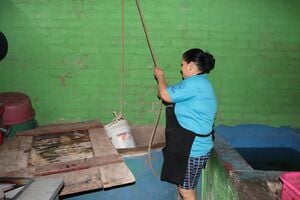
The purpose of using Appropedia, an open, wiki-style website was to explore new ways to document relevant community demographics but being able to separate it into modules, including a specific solution mapping module, in a format that communities co-created and could later use for planning purposes, to mobilize resources, and for any purposes they deemed pertinent.
Introduction[edit | edit source]
One of the key notions that drove this activity was that Solutions Mapping is a layered process. Identifying grassroots solutions and innovations is one layer but, understanding the context behind those solutions can result in multiple layers of information that adds texture to the potential of that solution for scale. So, combining TECHO’s community surveying methodologies with the Accelerator Lab’s solutions mapping practice presented itself as a great synergy. A good analogy would be to interpret it as adding multiple layers of “metadata” to each mapped solution.
Unexpected findings[edit | edit source]

Democratizing how community members organize and document data from their own communities[edit | edit source]
Perhaps one of the most interesting, unexpected findings from this exercise was that not only was the Appropedia wiki-style format so well received by communities, but it sparked their interest in documenting other relevant information on their community page. In the closing workshops, community leaders asked if they could add sections around the community’s history, past projects, new project ideas, and even fun facts and local legends.
Appropedia’s wiki format allows for anyone to edit information about a specific page and mainstreaming the use of this kind of platform could help democratize communities’ participation in the organization, prioritization, gathering and dissemination of their information, giving them some control over their narrative, which could be confronted with information from local governments and other entities in the community. Wikis are also regulated by other contributors so having a communities’ Appropedia page could serve as a minimum shared reality to balance power dynamics in the community.
Building layers of information for development and humanitarian purposes[edit | edit source]

In humanitarian and development settings, organizations spend resources and time collecting information about the communities they work with. Often, this process is duplicated or multiplied if different entities (including local governments) are working or have historically worked in the same community. Having a living repository of community information can create layers of information instead of parallel, often inaccessible sources of community data. This could also result in more articulated work between the organizations that work on a specific community via the sharing of relevant information that could provide a multidimensional perspective of the communities’ most pressing challenges. Lastly, this would reduce the communities’ burden of participating in duplicitous data collection exercises and surveys.
Leveraging Appropedia’s work on ontology, open know-how, and content management[edit | edit source]
As part of reflecting the solutions mapping role in the “Grassroots to Global” ecosystem, it is important to recognize the work that other organizations have already advanced and identify how we can best add value to that work. In this case, the synergies with sites like Appropedia are pretty evident. On one hand, the UNDP Accelerator Labs (through its Solutions Mappers) are arguably the largest global network of development professionals identifying and documenting grassroots solutions, therefore, a natural contributor to a global repository of appropriate technologies and development knowledge such as Appropedia. On the other hand, Appropedia does not only have the infrastructure but the expertise in organizing, and classifying “searchable” entries. Additionally, Appropedia’s focus on open knowledge aligns with the Accelerator Lab’s evolution towards an open-first approach to UNDP’s research and development.
Fun Fact[edit | edit source]
We also tested an analog format for presenting information to communities. This 27x43cm flipchart was a summarized version of the content of each community’s Appropedia page. It was designed for community leaders to use it in small meetings with other community members or with local organizations and even local government representatives. The pages with permanent information about the community were laminated for durability purposes, and the flipchart contained blank pages for community leaders to add more information, as required.
Conclusion[edit | edit source]
The successes and challenges of partners like the Honeybee Network and Appropedia are crucial for Accelerator Lab’s mission to be successful and for the Solutions Mapping practice to add value to the G2G ecosystem. By leveraging each group’s strengths, we will be able to activate an expanded global network of development professionals dedicated to unearthing the most ingenious, appropriate ways in which we can address development challenges, “upload” them into a digital space for universal access, and “download” them in other contexts for inspiration, adaptation, or scale.
We are only planting the seeds for that ecosystem to thrive, but it is encouraging to find such inspiring partners along the way.